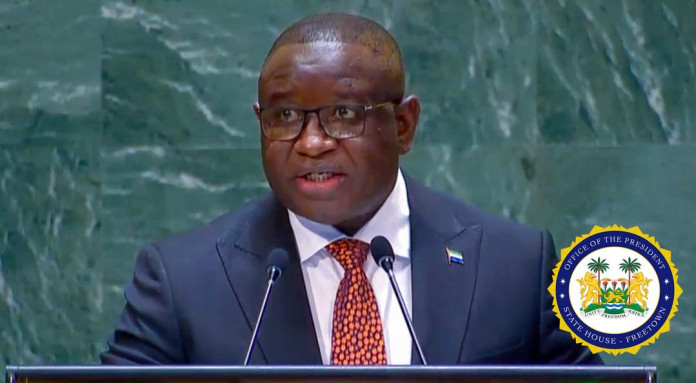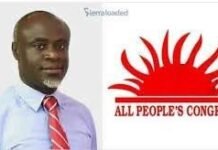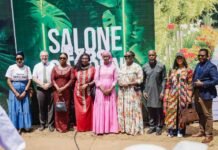By Amin Kef (Ranger)
President Dr. Julius Maada Bio of Sierra Leone on Sunday September 22, 2024 delivered a powerful call to action for global cooperation and reforms in multilateral institutions, during a high-profile session of the United Nations Summit of the Future in New York. Co-chairing an interactive dialogue on “Enhancing Multilateralism for International Peace and Security” alongside Ireland’s Prime Minister, Simon Harris, President Bio underscored the urgency of addressing modern global threats such as violent conflict, terrorism, climate change and health crises.
In his address, President Julius Maada Bio reflected on Sierra Leone’s own post-conflict recovery, recognizing the transformative impact of international partnerships, notably the United Nations, African Union and ECOWAS, in fostering reconciliation and peace. He emphasized that today’s threats are increasingly borderless and require robust multilateral action, stressing that no single nation can tackle them alone.
“These threats know no borders and cannot be tackled by any Member State alone,” President Bio stated, as he championed the revitalization of international cooperation to confront these unprecedented challenges.
The dialogue, held at the United Nations headquarters on Sunday, focused on reinforcing the global governance structures essential for maintaining international peace. President Bio highlighted how growing nationalism and geopolitical tensions pose serious threats to global stability. He made an emphatic case for reforming key institutions, particularly the United Nations Security Council, to better represent Africa. Despite being home to over a billion people, the continent remains significantly underrepresented in decision-making bodies tasked with resolving conflicts that disproportionately affect it.
“Reforms are needed to adapt our multilateral institutions to contemporary realities,” President Bio urged, calling for a restructured UN Security Council that reflects the voices of the Global South and Africa, which have long been marginalized in global governance.
Concluding his address, President Bio called on world leaders to collectively embrace multilateralism and seek innovative solutions to today’s challenges. “Together, we can forge a stronger multilateral system to address today’s challenges and prepare for tomorrow,” he affirmed, his words resonating particularly with nations advocating for more inclusive governance on the global stage.
Earlier, President Bio delivered another pivotal speech on behalf of the g7+ countries, urging world leaders to recommit to global peace and sustainable development. He presented the “Pact for the Future”, a roadmap designed to support fragile and conflict-affected states. President Bio stressed that these challenges are not theoretical but part of a daily struggle for millions, reinforcing the need for international cooperation.
In outlining the priorities for g7+ countries, President Bio called for national ownership, inclusive governance and innovative financing models to sustain development in fragile states. He also stressed the importance of science, technology, and digital cooperation, advocating for youth empowerment as a critical factor in driving positive change.
Building trust in conflict-affected regions, according to President Bio, remains the cornerstone of peace. He urged global leaders to work together to strengthen this foundation and press forward with meaningful reforms, particularly at the United Nations.
In a related development, President Bio engaged with key U.S. trade and investment agencies on Thursday, September 19, 2024, at a U.S. Government Roundtable on Trade and Investment. The discussions, aimed at enhancing economic collaboration between Sierra Leone and the United States, provided an important platform for Sierra Leone to showcase its reform agenda and explore new investment opportunities.
In his opening remarks, President Bio expressed gratitude to the U.S. Government for organizing the roundtable and reaffirmed Sierra Leone’s commitment to strengthening economic ties with the United States. He emphasized that expanding trade and investment partnerships was essential for fostering inclusive growth and shared prosperity between the two nations.
Highlighting his administration’s key priorities, President Bio pointed to significant governance reforms, infrastructure development, and human capital investment as areas ripe for collaboration. He underscored Sierra Leone’s transparency and anti-corruption measures as critical steps in attracting global investors. Furthermore, energy sector reforms, particularly through the Millennium Challenge Corporation (MCC) Compact, were hailed as central to expanding energy transmission and boosting economic growth.
President Bio also spotlighted the Feed Salone Programme, aimed at reducing poverty through sustainable agricultural development. He encouraged U.S. businesses to invest in Sierra Leone’s agricultural sector, especially in mechanization, research, and infrastructure development to support key value chains like rice, cocoa, and coffee.
In his concluding remarks, President Bio reiterated Sierra Leone’s openness to U.S. investment, assuring American businesses of a stable and transparent investment environment. He reaffirmed his government’s commitment to building a prosperous economy that benefits all Sierra Leoneans and deepens cooperation with the United States.
These events mark significant milestones in President Bio’s advocacy for reforms in global governance and his push to foster economic partnerships that drive sustainable development in Sierra Leone.




